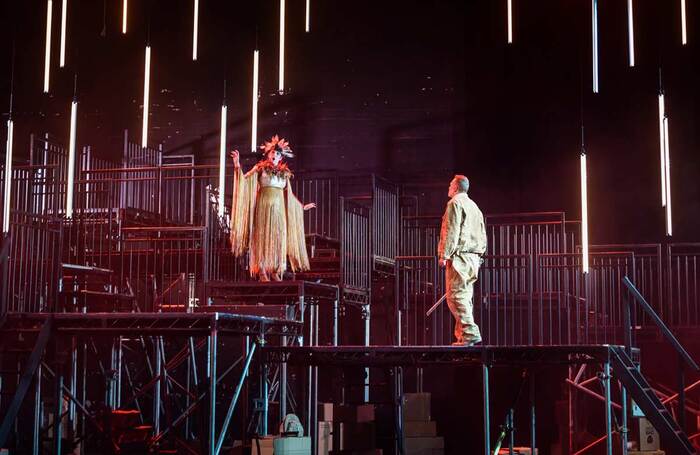Hackney Empire- 6th August 2022
Reviewed by Antonia Hebbert
5*****
Siegfried and Götterdämmerung are the third and fourth in Richard Wagner’s colossal Ring Cycle of four operas. Arcola Theatre has been working its way through them, starting with Das Rheingold in 2019, and Die Walküre last year. These are condensed and pared-down productions, with an orchestra of 18 rather than 100, and are much shorter than the originals. Adapted by Graham Vick and Jonathan Dove in the 1990s, they caused a sensation when they first appeared, and their flexibility is useful in the Covid era. But the main thing is that they provide a way to put on intense, thrilling productions of operas that are notoriously unwieldy and difficult to stage. The orchestra is Orpheus Sinfonia: it may be small but it packs a powerful punch, with a big, gorgeous brass sound and subtlety too. I am not expert enough to comment on music technicalities, but take it as read that for players and singers, this music is a titanic workout and hugely demanding.
The whole cycle tells the story of gold stolen from the Rhine maidens and turned into a magical ring, interwoven with the end of the old Norse gods and the destruction of Valhalla. In Siegfried, the eponymous hero has been brought up by the metalsmith Mime, who wants him to kill and be killed by the dragon Fafner, in order to get the dragon’s hoard of Rhinegold (and the Ring). Siegfried kills Fafner and also Mime, and boldly goes through a burning ring of fire to win Brünnhilde, daughter of the god Wotan (aka the Wanderer). She is one of the Valkyrie, the flying warrior deities who take fallen heroes to Valhalla, and has been imprisoned in fire because of events in a previous opera.
It is dizzyingly complicated, but one of the great things about these productions is that they tell their stories very clearly. Surtitles help, and the acting as well as the singing is absolutely wonderful. Neal Cooper is a big, bold Siegfried, looking like recruit for the US Marines; Colin Judson is Mime, creepily hopping about with a teddy bear and pretending he has been a good father figure. Elizabeth Karani is charming as the Woodbird who helps Siegfried; Lee Bissett is an enthralling Brünnhilde, and returns in the same part for Götterdämmerung. I think Brünnhilde will always seem more three-dimensional than bone-headed hero Siegfried, but their love is one of those opera things you find yourself accepting while being carried along by sublime music.
Staging these operas has always been a headache. Anything involving flying deities, giants and Rhine maidens could easily look ludicrous. Wagner himself resorted to building the Bayreuth opera house, to create a ‘mystic gulf’ of theatrical magic. This Ring production heads towards abstraction, wisely leaving it to the music, acting and spectator’s imagination to fill in the gaps. The set is a jumbled ziggurat of scaffolding platforms, suggestive of a scrapyard or the stuff behind a stage (or indeed the end of my garden, but that is another story). It works perfectly with subtle changes of lighting to suggest Mime’s cave or Fafner’s lair. Fafner is the excellent Simon Wilding (more of him later) slithering sinisterly, which is dragon enough for me. It is all stripped down, but takes you by surprise, as in the extraordinary scene between Wotan (Paul Carey Jones) and Erda (Mae Heydorn), who sings divinely in a sort of rippling cloud of ethereal stuff.
In Götterdämmerung, some carpets, lamps and chairs transform the set into a bourgeois home. This is the base of Gunther and Hagen, brothers of the Gibichung clan, whose head is Alberich (Mime’s brother), the one who stole the gold in the first opera. The production team must have had fun with this: Simon Thorpe is fussy and silly as Gunther, while Simon Wilding (formerly Fafner) is fabulously evil and brooding as Hagen. With encouragement from Freddie Tong’s malign Alberich, they scheme to make Siegfried forget Brünnhilde and couple up with their sister Gutrune, while Guthrun takes Brünnhilde for himself. Yes, even crueller than Love Island, and heartrendingly done.
Before that happens Brünnhilde has a visit from her sister Valkyrie Waltraute (gorgeous mezzo Angharad Lyddon) asking her to put things right by returning the Ring to the Rhine maidens; later Siegfried also turns down this chance, and we get a brief, lovely taste of Rhine maidens chorusing from Mae Heydorn (again), Lizzie Holmes and Bethan Langford. Siegfried this time is Mark Le Brocq, who does a good job of looking like someone under a spell and suddenly, too late, wakes up from it. Of course everything goes wrong, or rather destiny works out as it must – Seigfried dies, Brünnhilde joins him on his funeral pyre, the Rhine rises up and Valhalla is destroyed.
We don’t see all this, and serious Wagner fans may be disappointed about the stuff that is left out of this mighty final opera of the Ring Cycle. If you can cope with that though, it is riveting, edge-of-the-seat stuff, that you really don’t want to end. The director is Julia Burbach; Bettina John is the designer; and Peter Selwyn conducts this marathon.
Siegfried and Götterdämmerung are part of Arcola’s summer-long Grimeborn Festival, which champions adventurous, accessible and affordable opera. There are plenty more to come this year: see https://www.arcolatheatre.com/grimeborn/

